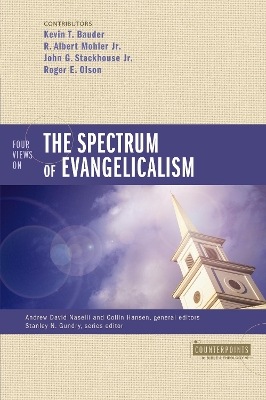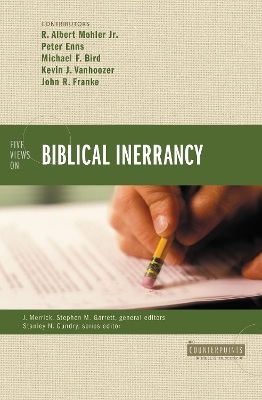Counterpoints: Bible and Theology
2 total works
Four Views on the Spectrum of Evangelicalism
by Kevin Bauder, R. Albert Mohler, Jr., John G. Stackhouse Jr., and Roger E. Olson
Understand the history, core values, and divisions as they've developed within the Evangelical Christian movement.
Four Views on the Spectrum of Evangelicalismcompares and contrasts four distinct positions on the current fundamentalist-evangelical spectrum. Each contributor offers their case for one of four primary views:
- Fundamentalism – defended by Kevin T. Bauder
- Conservative/confessional evangelicalism – defended by R. Albert Mohler Jr.
- Generic evangelicalism – defended by John G. Stackhouse Jr.
- Postconservative evangelicalism – defended by Roger E. Olson
Each author explains and defends his position, which is critiqued by the other three authors.
The Counterpoints series presents a comparison and critique of scholarly views on topics important to Christians that are both fair-minded and respectful of the biblical text. Each volume is a one-stop reference that allows readers to evaluate the different positions on a specific issue and form their own, educated opinion.
Five Views on Biblical Inerrancy
by R. Albert Mohler, Jr., Peter E. Enns, Michael F. Bird, Kevin J. Vanhoozer, and John R. Franke
The inerrancy of the Bible--the belief that the Bible is without error--is often a contentious topic among mainstream Christianity.
Like other titles in the Counterpoints collection, this volume gives those interested in theology the tools they need to draw informed conclusions on debated issues by showcasing the range of positions in a way that helps readers understand the perspectives--especially where and why they diverge.
Each essay in Five Views on Biblical Inerrancy considers:
- The present context, viability, and relevance for the contemporary evangelical Christian witness.
- Whether and to what extent Scripture teaches its own inerrancy.
- The position's assumed or implied understandings of the nature of Scripture, God, and truth.
- Three difficult biblical texts: one that concerns intra-canonical contradictions, one that raises questions of theological plurality, and one that concerns historical authenticity.
Five Views on Biblical Inerrancy serves not only as a single-volume resource for surveying the current debate, but also as a catalyst both for understanding and advancing the conversation further. Contributors include Al Mohler, Kevin Vanhoozer, Michael Bird, Peter Enns, and John Franke.

